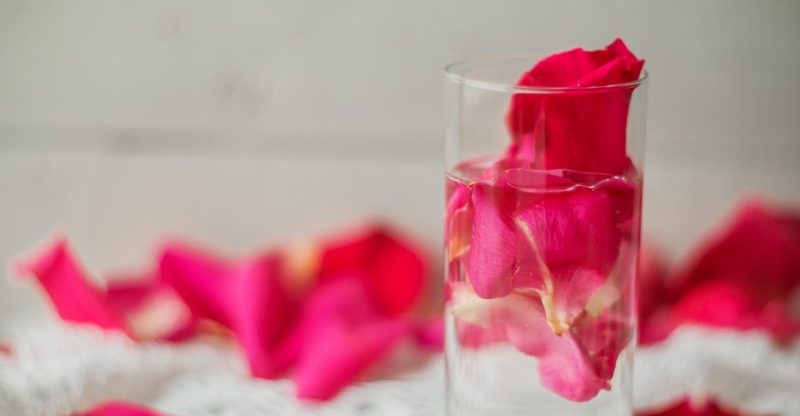How to Make Rose Water
People have been using rose water for thousands of years to treat health problems, as well as to improve their skin and hair.
Rose water is thought to have originated in Iran, but its many uses and benefits are recognized around the world.
Not only does rose water smell beautiful, but it also has many potential health benefits.
Making your own rose water at home is simple and easy, so why not try this beauty and healthcare treatment today?
The Benefits of Rose Water
Rose water has traditionally been used to help improve the skin.
However, it is now understood that it has many other benefits.
We will first discuss the benefits that rose water can bring to your health and beauty routine.
We will then share an easy method for making this miracle elixir in your home.
Calms Your Skin
Rose water is a powerful anti-inflammatory substance that can calm irritated and inflamed skin.
It also contains antioxidants which help to heal damaged cells and reduce the effects of aging, sun, and free radicals.
Those who have acne, rosacea, psoriasis, eczema, and other skin disorders will benefit from the calming effects of rose water.
Women have been using rose water for centuries to reduce puffiness and redness.
Rose water is excellent for your skin, since it tightens pores, smooths fine lines and the appearance of wrinkles and even balances your skin’s pH.
As a treatment for freshening your complexion and calming skin, rose water is nature’s perfect choice.
Slows the Aging Process
The antioxidants in rose water can help to reduce the signs of aging.
It is often found inexpensive beauty products, because of its effectiveness for eliminating fine lines and wrinkles, as well as helping skin look younger and more refreshed.
Enhances Your Mental Health
Rose water has long been used to encourage relaxation and also help to lower stress.
Research has helped find significant benefits to mental health from rose water, including stimulating natural, anti-depressant effects in the brain.
Rose water reduces anxiety and relaxes the mind and body, allowing you to sleep more soundly and unwind at the end of the day.
You can spray rose water on your pillow to enhance your sleep.
You can use rose water in a diffuser or in a therapeutic steam bath to relax and boost your feel-good hormones.
Those who use rose water regularly, can see a reduction in depression, anxiety, stress and the effects of tension.
New research even shows that rose water offers promise for treating dementia.
Fights Infection
Rose water is a natural antiseptic that can help you treat, as well as prevent infections.
Rose water is often included in natural antiseptic products, so why not use your own?
You can even safely use rose water in your eyes to treat conjunctivitis and other eye infections.
As a natural analgesic, it is also a perfect fit for eye problems.
Keeps Your Mouth Healthy
You can use rose water as a natural mouthwash.
This powerful infusion reduces inflammation from canker sores, mouth ulcers, and other problems.
As an antiseptic, it cleanses your mouth and also helps remove the bacteria that cause plaque and gum disease.
It is safe to swallow, so you don’t need to worry about use by children.
Soothes a Sore Throat
Rose water has long been used to treat sore throats.
It naturally soothes irritated tissues, and its antiseptic properties can also help to reduce infection.
The next time you have a sore throat, try gargling with rose water and even spraying on your throat when it feels scratchy.
Resolves Indigestion
Rose water has also been used traditionally to help reduce symptoms of indigestion.
Rose water naturally stimulates bile production, which can aid digestion.
It is also known to calm an upset stomach and reduce nausea.
Enhances Your Cooking
Rose water has been used in traditional Middle Eastern cuisine for generations.
Many popular dishes use rose water, and it adds a wonderful aroma to stews, rice, desserts, salads, and even cocktails.
Heals Wounds
If you have a cut or a scrape, you can use rose water to treat your wound and so it heals faster.
Rose water can help fight off infection, calm inflammation and keep your injury clean.
Enhances Your Mood
You can also lower your symptoms of depression and anxiety, by using rose water.
The aroma triggers responses in the central nervous system that reduce nervousness and promote the release of hormones that make you feel more positive.
Relieves Headaches
If you have frequent tension headaches, you can use rose water for aromatherapy to relax your muscles and treat your headaches.
Rose water is a natural de-stressor, and it is excellent for treating tension headaches.
You can even sprinkle some on a cold washcloth to use as a compress, treating your headache in two effective ways.
Making Your Own Rose Water
When making your own rose water, you want to start with high-quality flowers.
You can use either fresh or dried flowers.
However, you want to ensure they are not sprayed with pesticides and come from a reputable supplier.
Dried flowers should not have any additional chemicals, coloring or fragrance applied to them.
If you are harvesting your own petals, be sure to cut your flowers early in the morning to get the most fragrance possible.
You can use domesticated or wildflowers, whichever you prefer and have access to.
There are two methods for making rose water. We outline both below.
Boiling Method
There are several methods for making rose water.
This is the easiest at-home technique.
You need a few supplies and it yields fragrant water.
To start, gather three-quarters of a cup of fresh (one-quarter cup dried) rose petals into a small pot, then add one and one-quarter cups of water.
Bring this to a boil, cover and lower the heat to gently simmer the petals, until they lose all their color.
Remove the pot from the heat and allow it to cool completely.
Strain the petals through cheesecloth, nut bag, or extra-fine sieve into a glass bowl.
Pour your finished rose water into a spray bottle or glass jar of your choice.
You can store your rose water at room temperature for up to one week or in the refrigerator for up to one month.
Hydrosol (Distillation) Method
This method requires a little more effort.
However, the rose water that it creates lasts longer without spoiling and is light and refreshing.
To begin, place three liters of distilled or spring water into a large stop pot.
Be sure your pot is made from a non-reactive metal, like stainless steel, or is enameled.
Place your flower petals into the water and allow them to sit for several hours.
Next, place a metal vegetable strainer inside your pot, covering the petals.
Place a glass bowl in the strainer, then put a lid on the top and place it upside down.
Bring the water in the pot to a boil, then lower the heat to a simmer.
Place a plastic bag filled with ice on top of the lid and keep your pot simmering over medium heat for at least two hours, or until you get the desired amount of rose water.
As the water boils and steam rises, the vapor will condense on the lid, then drip down into the bowl below.
The liquid that collects in this bowl is your distilled rose water.
After you have your desired amount of rose water, remove everything from the heat and allow the water to cool completely, before placing it inside a glass bottle or jar for storage.
You should store this in the refrigerator to maximize its lifespan.
The Many Uses for Rose Water
Now that you know the benefits of rose water, as well as how to make your own at home, it’s time to start using this wonderful, natural remedy.
But how? Here are some recommendations for excellent uses for your homemade rosewater:
- Adding several drops to a steaming bathtub will enhance the feel of our skin, relax your mind and body and provide you with a spa-like bathing experience.
- Spray directly onto your face as a daily toner. This will help prevent acne, as well as support proper skin pH.
- If it’s warm outside, store your spray bottle in the refrigerator for a refreshing, cool facial spray.
- Spray rose water all over your body after a bath or shower, to help maintain smoothness and fresh skin. Rose water also adds moisture and calms irritated skin.
- Add a few drops of rose water to your favorite cream or lotion to enhance its benefits.
- Add rose water to your unscented laundry detergent and all your clothes will come out smelling great. You can also spritz clothing with rose water while ironing, to create fresh, beautiful-smelling as well as wrinkle-free clothing.
- Create your own face mask to calm irritated skin. Combine rose water with turmeric, sandalwood powder, and chickpea flour to create a paste for your skin, then apply.
- Mix rose water with apple cider vinegar for an effective astringent for oily skin.
- Combine several drops of rose water with your regular shampoo or conditioner. This will add hydration to your hair, as well as keep you smelling like roses all day.
- Combine rose water with several drops of coconut oil to create an effective makeup remover and cleanser.
- Freeze rose water in ice cube trays, then rub onto sunburned skin to soothe away redness. Frozen rose water also helps with inflamed skin, such as from acne or eczema.
- Create a lip stain, by combining beetroot and rose water. Bake chopped beetroot at 140 degrees F for eight to ten hours to dehydrate the plant material, the grind it into a powder. Add enough rose water to create a paste, which you apply to your lips for 15 minutes. Wash the paste off to reveal perfectly stained and supple lips.
- Add rose water to equal parts of coconut oil and glycerin to create a natural moisturizer. Mix these thoroughly together, then apply once or twice per day to add a natural, protective barrier to your dry skin.
- Treat acne with equal parts of lemon juice and rose water. Leave the mixture on for 15 minutes, rinsing with cool water. This mixture exfoliates, heals acne and leaves behind conditioned skin.
- If you want to brighten skin and reduce spots of hyperpigmentation, combine rose water and honey to make a face mask. Allow this to sit for 15 minutes, then rinse.
- Cucumber and rose water make a refreshing face mask. For extra exfoliation and pampering, add honey.
- Remove hair effectively by combining three tablespoons of rose water with a one-half teaspoon of alum powder, an effective natural hair remover. Be sure that the powder is completely dissolved, then apply it to areas with unwanted hair, allowing it to sit for one hour. Rinse with cool water and then moisturize with the oil of your choice.
- Sandalwood powder and rose water can also be effective in reducing acne breakouts.
Conclusion
Rose water has been used for centuries because of its many beneficial properties.
As a traditional beauty product, it has long been known that rose water helps to improve the look and feel of skin.
Rose water is now recommended to treat many different skin disorders, in addition to the daily care of your skin.
It has powerful properties which tone, cleanse and strengthen skin while fighting aging and sun damage.
In addition to helping you look better, rose water can help improve your health.
It is a natural treatment that is effective for headaches, depression, anxiety, indigestion, sore throats, and wounds.
It can be used to improve your oral hygiene, make your food taste better and even help you relax.
Making your own rose water is easy to do at home and takes very few materials.
Once you make your own rose water, the applications for your beauty and health are seemingly endless.
Don’t forget to purchase organic flowers without chemicals, pesticides or added fragrance.
FDA Compliance
The information on this website has not been evaluated by the Food & Drug Administration or any other medical body. We do not aim to diagnose, treat, cure or prevent any illness or disease. Information is shared for educational purposes only. You must consult your doctor before acting on any content on this website, especially if you are pregnant, nursing, taking medication, or have a medical condition.
HOW WOULD YOU RATE THIS ARTICLE?






